Taking care of your motorhome means learning about how to handle an RV oil change.
While there are thousands of oil change services for automobiles, finding one that can handle your size RV can be challenging.
To help you navigate the land of RV oil changes, I put all the details here in this guide, including:
- The importance of changing RV oil
- RV oil change schedule
- Locating RV-friendly oil-change centers
- What you need to know about DIY RV oil changes
- RV oil change cost
Don’t let engine problems ruin your RVing adventures. Stay on top of your motorhome’s maintenance by following the tips below!
Why RV Oil Changes Are Critical
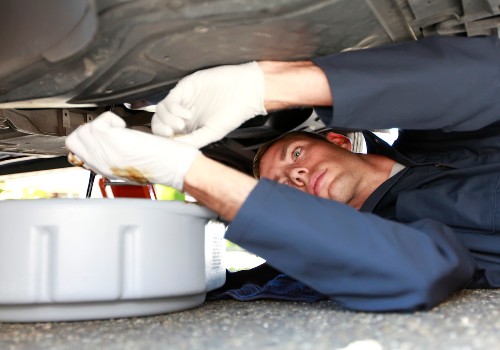
The reason the condition of the oil in your recreational vehicle is so important is that you don’t want to sideline camping trips nor ruin your expensive motorhome by burning up your engine.
RVs are heavy, and the engine works extra hard to move that bulk around. Keeping the engine well-lubricated is crucial for optimal performance and longevity.
Pulling weight, especially if you’re towing a dinghy, increases the heat in the engine. Oil thins out when hot, so it must be clean enough to allow free movement of components when it’s under duress, so nothing gets damaged.
The way you use your RV also plays a part in how quickly the oil degrades.
If you take trips that cover long stretches of flat highway miles, it’s much easier on the engine and oil usage.
If you take lots of short trips and use your camper for daily excursions at your destination, you’ll dirty your oil much quicker.
RV oil oxidation is the first culprit that immediately starts to degrade the fluid.
When the oil contacts oxygen, moisture, and metal engine components, chemical changes occur that break down the oil. The more you drive your motorhome, the oil has more exposure to these and other elements.
If you neglect to change your RV oil often enough, the engine’s components and seals will wear out, eventually leading to expensive repairs and a halt to RV vacations until you fix the problem.
How Often You Need to Change RV Oil
When it comes to changing your motorhome’s oil, always err on the side of caution and perform the task earlier than necessary rather than later.
In general, most motorhome mechanics suggest changing the oil a minimum of once every eight months. For heavy usage, you will most likely need two to three oil changes a year.
Each manufacturer will indicate in the manual when it’s best to change the RV oil, but this schedule won’t necessarily work for your particular circumstances.
Since every motorhome owner drives their camper differently, it’s much more important to remember to watch your mileage and pay attention to use. If you’re putting in miles in hilly terrain like the mountainous West or are at your max GVWR of your motorhome, you’ll need to change the oil sooner.
How often do you change the oil in a diesel engine RV? Diesel-engine motorhomes don’t need any special care when it comes to oil change scheduling during use, but it’s imperative to change the oil before you put the RV into storage.
Why? Diesel engine oil is more viscous so the fluid can fill the larger gaps between the crankshaft bearings and rod found in diesel motorhome engines.
Dirty, cold oil will form sludge much quicker in a more viscous formulation than fresh, standard-weight oil. The last thing you want to do to your diesel engine (or gas for that matter) is to force thick, sludgy oil through it when you start up the motorhome after a period of storage.
Always change the oil before camper storage that exceeds two months, even if you didn’t drive the RV that much during the camping season.
The extra cost may pinch your wallet, but it’s a small price to pay to keep your motorhome’s engine in good condition.
Where to Find RV-Friendly Oil Change Centers
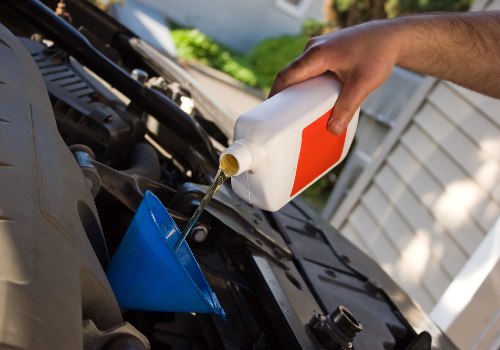
Many new RVers wonder if Walmart or Camping World will do oil changes. The answer is that yes, you can typically have service done at both these locations.
Be aware that not every Camping World will do oil changes, as some locations are strictly selling retail products or have a limited staff.
Not every Walmart automotive service center has tall enough bay doors or a lift capacity that can handle large motorhomes’ weight.
Other well-known oil change companies, such as Jiffy Lube and local mom and pop mechanic shops, may also handle RVs.
Always call ahead and ask if they can work on your size RV and make an appointment to alert staff to your RV’s dimensions so they can prepare for your arrival.
While on the road, the best bet for RV-friendly oil change locations is to look for shops that specialize in trucks or big rigs, as these have ample space for any size motorhome to maneuver in and out without worrying about scratches or dents.
I once had staff at an oil-change garage back my motorhome into a boulder because he didn’t have experience driving such a large vehicle, and the lot was tight.
Needless to say, I got a free oil change and a check to repair the extensive damage to my siding.
I now vet the roominess at any oil change location before I commit to the work, and it is an excellent tip to keep in mind to avoid extraneous damage to your motorhome.
WARNING: Reviews from Camping World customers for oil changes and general RV repair work are poor. You may want to consider using an alternative location if possible.
Bring the Oil Change to You
Are you pressed for time or worried about taking your motorhome to a shop for an oil change?
The chances are high there is a mobile RV oil change service in your, like Valley Mobile Oil in California, that will come to your camper’s location and change the oil on the spot.
This type of service is ideal after bringing your RV to a storage facility, so you know the oil is fresh before sealing it up for the winter months. Mobile oil changes are also great during campground stays when you don’t feel like packing up your site to drive the RV to a service center.
Be sure to get approval for any oil change taking place at your home, storage lot, or campground as some localities forbid it for environmental reasons.
Signs It’s Time to Change Your RV Oil
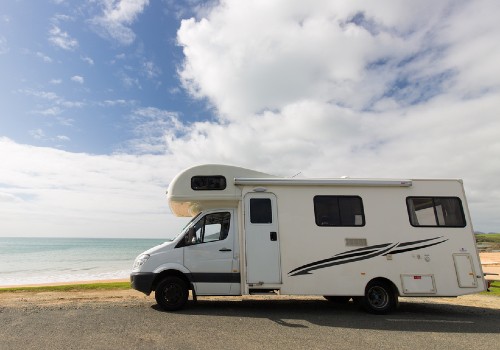
When your oil service indicator illuminates on your motorhome’s dash, it makes it easy to know you need to get an oil change, but not all RVs have this light (or have one that works reliably.)
Often, the service alert light is set on a timer and is not reading the quality of your oil. Manufacturers often set dashboard service lights to go off when a certain number of miles is hit and nothing more.
Engine Noise
Getting to know how your RV sounds and feels when the engine is running can pinpoint oil engine issues.
If you start to hear grinding, knocking, or squealing coming from your engine compartment, check out your oil situation as soon as possible.
Oil Color
The color of fresh oil is translucent and golden brown. Dirty oil appears dark brown or black, and it will become more opaque as debris builds up in the fluid.
Learn the condition of your motorhome’s oil-life stages by pulling out your oil dipstick weekly to investigate the fluid’s appearance.
Always pull the dipstick, wipe off the end, and reinsert. Pull out again for a reliable sample.
Oil Level
Don’t overlook the amount of oil in the tank. A low level can indicate you have a leak or your engine is burning up the oil during travel.
Don’t panic if your engine is burning oil and you have an old RV, as this is very common in vintage motorhomes and part of its charm.
Top off the oil or take it in for service right away.
Exhaust Smell or Smoke
If your tailpipe is spewing out a heavy smoke-like vapor, chances are you have an oil leak somewhere in your engine’s system that needs attention immediately.
You may also smell the oil as your RV is idling, as the pressure of the running engine can force oil out of worn gaskets.
What You Need to Know About DIY RV Oil Changes
Many RV owners choose to change the oil themselves to save money and time.
If you have easy and safe access to your oil tank, you should be able to perform a full oil change on your RV in under 45 minutes.
Here are the five things to ask before starting a DIY oil change:
1. Do the Rules Allow It?
Verify that you can safely and legally change the oil at your location. There’s a possibility of oil drips or spills, so most campgrounds and many towns have rules regarding how and where oil changes can occur.
2. Do You Have the Right Type of Oil?
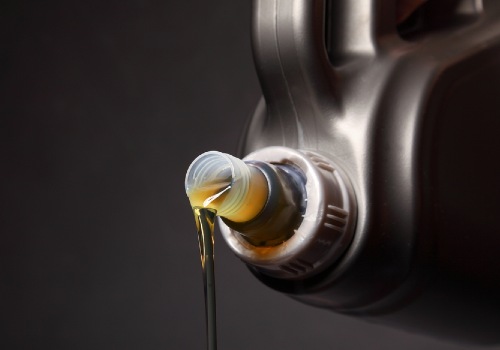
Check your owner’s manual for oil type and weight recommendations. Don’t alter the oil’s weight or the amount you’ll need for a complete change of fluid.
Peek at your RV warranty information. You may void your warranty if you don’t use the correct oil the manufacturer recommends.
Want to Connect With a Community of Over 1,078 RV Enthusiasts?
Watch the oil-label codes if you have a diesel engine RV. If your motorhome requires ultra-low sulfur diesel (ULSD) fuel, you have to use CJ-4 motor oil.
3. Synthetic or Conventional?
Conventional oil has a petroleum base and does the job of lubricating the engine as long as you change it when dirty.
Synthetic oil has properties that reduce oxidation, which makes it ideal for motorhomes. It also flows faster in cold temperatures for quicker engine protection on startup.
If you aren’t using synthetic oil, consider swapping over, especially once your RV is over five years old.
If your motorhome is over ten years old, do some research before switching to synthetic.
Older engines aren’t as fine-tuned as ones today and need an oil that remains thicker at high temp for optimal performance.
Running a vintage motorhome on synthetic oil may also cause leakage as the thinner fluid escapes gaskets and drips onto the ground or into your combustion chambers.
4. Do You Have All the Supplies?
Don’t start your oil change only to find out your missing the correct size tool or have a pan or container large enough to hold all the oil. Cars typically contain 4-6 quarts of oil, but motorhomes average 6-8 quarts.
Lay down an absorbent pad under the oil tank to catch any drips.
Don’t forget the oil filter. Buy a new high-quality oil filter and install it after you change the oil.
TIP: Fill up the new filter a 1/4-inch from the top with oil before installing it. This trick helps maintain the system’s pressure instead of letting the engine run without oil pressure until an empty filter fills.
5. Do You Have a Place to Dispose of the Used Oil?
Never pour old oil down a drain, into waterways, or onto the ground. Pour the oil into plastic jugs and cap them off.
Dispose of old oil by taking it to your local hazardous-waste drop-off location or any of the major oil-change service centers that accept dirty oil for recycling.
How Much Does an RV Oil Change Cost?

How much is an RV oil change?
The average price for a gas motorhome using conventional oil is $80-$100. This price includes the cost of a new oil filter.
The average price for a diesel Class A motorhome oil change is $150-$190, while a Class C is $100.
Campervans average $60-$90, much like a car, and usually fit easily into service center repair bays.
You’ll pay more for synthetic oil in your motorhome, but it’s worth the extra cost as the fluid extends engine life. A quart of synthetic oil costs about twice as much as conventional.
Mobile RV oil change services start around $100 for a gas motorhome, $130 for a Class C diesel, and $225 for a Class A motorcoach.
All oil change services typically offer other engine maintenance options you can perform at the same time, such as:
- Transmission flush
- Coolant flush
- New air filter
- New fuel filter
- Allison transmission tune-up
- Hose replacement
Adding any of these services will increase your final bill but is a great way to keep all your motorhome’s engine maintenance requirements on track and done on time.
In Summary
It’s smart to protect your investment by never letting your motorhome miss a scheduled oil-change service.
Taking care of your RV isn’t only about maintaining value but also about keeping your motorhome’s engine running smoothly so you can travel with less worry.
I hope this guide opens your eyes to the importance of RV oil changes and helps you find the perfect timing for your motorhome’s next service!
RV Oil Change for Beginners (Video)
"Man cannot discover new oceans unless he has the courage to lose sight of the shore."
-- Andre Gide

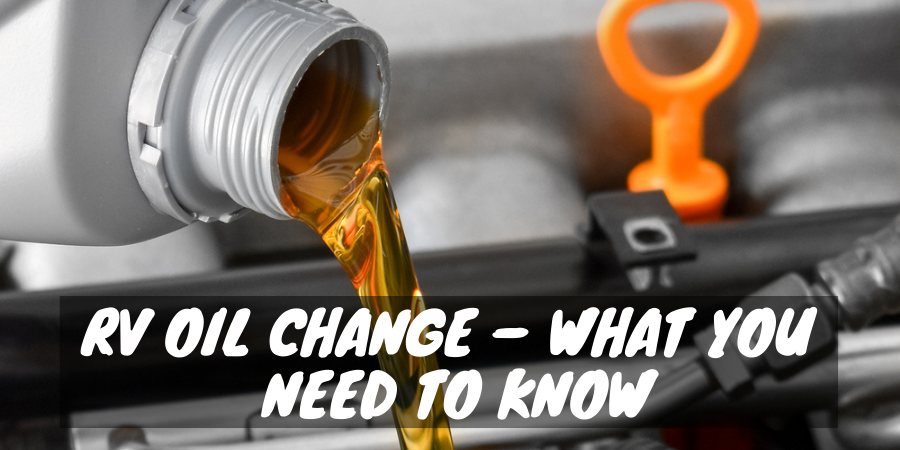







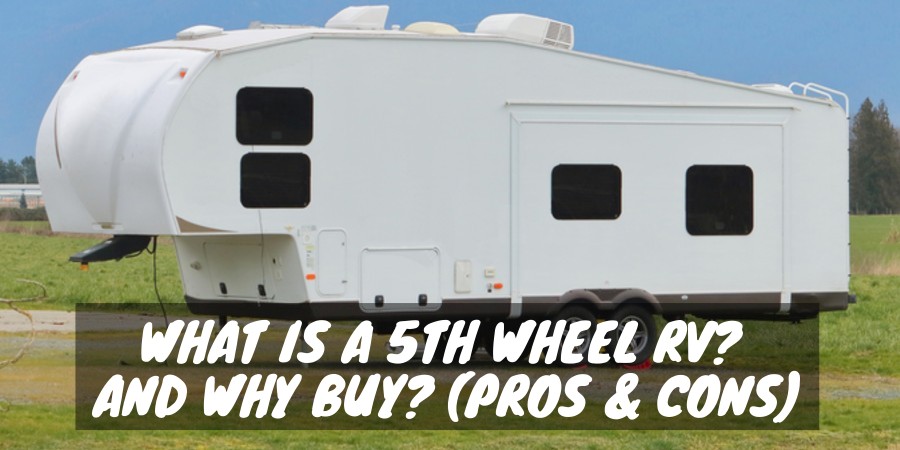


Just had the oil changed grease job on my gas class A motor home . Bill was 547 dollars . Was that too much . That was the only things that was done